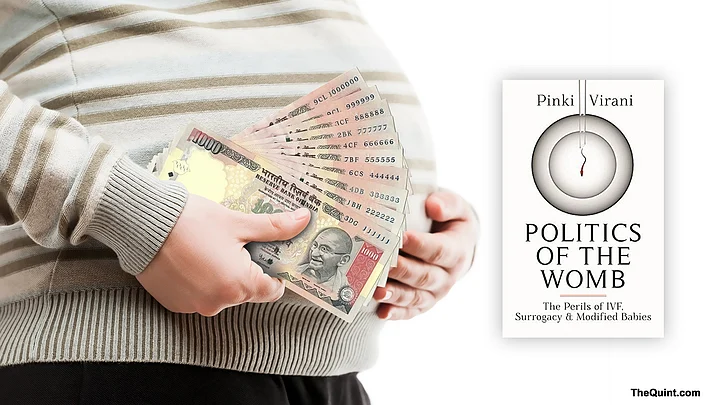The Surrogacy Regulation Bill (2016) has failed to address the issue of egg trafficking and would not stop poor women in India from being exploited, says author and journalist Pinki Virani. The bill, which has sparked debate, has put a ban on commercial surrogacy and has kept homosexuals, live-ins and unmarried couples out of the ambit of those who can take the surrogate route.
Journalist and author Pinki Virani’s latest book, published by Penguin Random House India, Politics of the Womb: The Perils of IVF, Surrogacy and Modified Babies, highlights the dark side of the surrogacy industry and talks about various misconceptions around the IVF (in-vitro fertilisation).
The author, through various international studies as well as on the basis of experts’ opinion, unveils why the very idea of subjecting a woman to painful and often daunting procedures of IVF is akin to treating her like cattle.
Horrific instances, wherein foreign nationals under the garb of surrogacy have actually turned out to be pedophiles reveals the extent of damage wreaked by the medical mart (surrogacy industry). The Quint spoke to Pinki Virani to understand if the recent Surrogacy Regulation Bill (2016) cleared by the cabinet is in fact a step in the right direction.
What is your reaction to the cabinet clearing the Surrogacy Regulation Bill (2016)?
There are two types of surrogacy, as everyone should know. But interestingly, a section of vested interests is not allowing Indians the chance to fully understand this difference. There is commercial surrogacy — wherein a random woman, exploitatively poor, is routinely underpaid to be a reproductive slave.
And there is altruistic surrogacy — wherein a woman would be, largely, the opposite, because she is exercising her reproductive choice without that all-crushing pressure of money.
To children born in the natural way, their mother is their complete biological mother [which is how almost all of the mothers of The Quint’s readers might well be], both genetically [it’s her egg] and by birth [her body carried the child].
If we keep our own mothers in mind, and those Indian ladies who are either about-to-be mothers or enjoying the idea of being one in the future, it is a step in the right direction that India joins most international countries in disallowing commercial surrogacy.
It needs to be underlined that the proposed law is halting commercial surrogacy for everybody, across the board, without any discrimination.
Have most of the concerns you’ve raised in your book been addressed in the current Bill?
More needs to be done and if given the opportunity, I shall try and do my best towards it. For example, the altruistic surrogate needs more protection.
Then there is the stipulation of “close relative” which needs a small re-defining, even though the age-band between 25 and 35 years should work well for both the altruistic surrogate as the birth-mother and for the baby with regard to its foetal health.
Then there is the current wording on what combination of genes would be inserted as an embryo, via IVF, from the intending parents into the altruistic surrogate.
The language is a bit hazy and needs to be water-tight. I am told [I have not seen the Cabinet-approved note myself] the current wordings are like so: “The surrogate mother will carry a child which will be genetically related to the intending couple.” Unscrupulous fertility clinics might well manipulate — there is at least one known case — the father-in-law’s semen with the daughter-in-law’s egg since her husband does not have useable sperm.
One of the many reasons I wrote Politics Of The Womb – The Perils Of Ivf, Surrogacy & Modified Babies was that it was time to rip off — as everyone should keep doing so that there is an ongoing reality check — this smug veil of “Oh but it’s all okay because there is no actual act of sex, it’s the miracle of IVF, and look she can now be a mother!”
A possible grey area with altruistic surrogacy can be the emotional turmoil associated with a near one in the family acting as a surrogate. After all, surrogacy is still a taboo in many households and India has around 30 million infertile couples.
It really is also time for Indians to question what is in danger because of too-entrenched medical vested interests. Let Indians speak up to medical power and ask, “Where exactly has this figure come from? Considering that there is no centralised authority as yet to control unscrupulous fertility clinics, never mind collate figures, what is the basis for this number?”
My research for POW has also uncovered that there have been instances where couples are, in fact, not infertile but nevertheless put through the expense and agony of several IVF cycles. For them, the book carries a specially formulated fertility work-up.
The book raises several disturbing questions as it highlights how heavy doses of chemicals and drugs as part of IVF procedures are used to stimulate production of ova, actually giving a semblance of women being treated as cattle. Does the Bill have enough provisions to prevent instances of oocyte trafficking?
This Bill is only within the context of surrogacy. There will either need to be a separate law on oocytes, which is the female egg or ova. Or it will need to be part of an ART [assisted reproduction] Act.
If this is not done, urgently and thoroughly, Indian girls will be targeted as routinely as they currently are, not only by agents but also directly by unregulated fertility clinics. Given the dreadful downsides, listed in POW, to the health of oocyte-sellers — and these are both short and long-term — this is a disaster-in-the-making if the government does not put in stringent curbs as fast as it can.
Also Read: Surrogacy Ban: State Should Stay out of an Individual’s Choice
